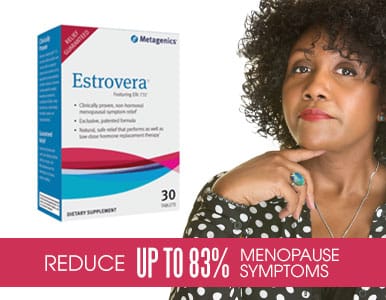Menopause
At Sweetwater OB GYN and Associates we offer a variety of medical treatments along with health solutions to improve most menopause symptoms.
Common symptoms range from hot flashes, vaginal dryness, pain during sex, hormones, incontinence, and osteoporosis. We offer one of the most popular medications in today’s market called Estrovera ® ( anon-hormonal product for menopause symptom relief).
Menopause & Sweewater OBGYN
At Sweetwater OB GYN and Associates, we will treat your symptoms with care and dedication because we do understand the importance of healthy balance. Menopause can be managed and treated properly so you can continue feel well and go on with your daily routine with minimal interruptions.
Here is some information that explains some of the subjects related to Menopause (courtesy of WebMD).


Estrovera® – Our Non-Hormonal Product For Menopause Symptom Relief
Estrovera is a natural option that features ERr 731, a special extract of Siberian rhubarb, demonstrated in clinical studies to significantly reduce menopausal symptoms—offering an effective and safer option for both peri- and postmenopausal women.*
Effective Relief for Menopausal Symptoms*
Clinically shown to dramatically reduce the number of daily hot flashes and relieve a wide range of other symptoms*
Efficacy Comparable to Hormone Therapies*
Demonstrated to relieve hot flashes to a similar extent as estrogen-based therapies and exceed reported results of other phytoestrogen and botanical approaches*
Unprecedented Scientific Validation for a Phytoestrogen Approach*
Multiple short- and long-term studies with over 400 peri- and postmenopausal women—published in peer-reviewed journals—confirm efficacy and predicted safety*
Excellent Safety Profile*
ERr 731 has been professionally recommended for over 20 years and no clinically relevant changes in safety parameters have been observed in clinical trials*
Frequently Asked Questions
What Is Menopause?
Menopause is a normal condition that all women experience as they age. The term “menopause” can describe any of the changes a woman goes through either just before or after she stops menstruating, marking the end of her reproductive period.
How Does Natural Menopause Happen?
Natural menopause is not brought on by any type of medical or surgical treatment. The process is gradual and has three stages:
Perimenopause:
This typically begins several years before menopause, when the ovaries gradually make less estrogen. Perimenopause lasts up until menopause, the point when the ovaries stop releasing eggs. In the last 1 to 2 years of perimenopause, the drop in estrogen quickens. At this stage, many women have menopause symptoms.
Menopause:
This is the point when it’s been a year since a woman last had her last menstrual period. At this stage, the ovaries have stopped releasing eggs and making most of their estrogen.
Postmenopause:
These are the years after menopause. During this stage, menopausal symptoms such as hot flashes ease for most women. But health risks related to the loss of estrogen rise as the woman ages.
What Causes Menopause?
Menopause is considered a normal part of aging when it happens after the age of 40. But some women can go through menopause early, either as a result of surgery, such as hysterectomy, or damage to the ovaries, such as from chemotherapy. Menopause that happens before 40, regardless of the cause, is called premature menopause.
What Conditions Cause Premature Menopause?
Premature menopause can be the result of genetics, autoimmune disorders, or medical procedures. Other conditions that may cause early menopause include:
Premature ovarian failure: Normally, the ovaries make both estrogen and progesterone. Changes in the levels of these two hormones happen when the ovaries, for unknown reasons, prematurely stop releasing eggs. When this happens before the age of 40, it’s called premature ovarian failure. Unlike premature menopause, premature ovarian failure is not always permanent.
Induced menopause: “Induced” menopause happens when the ovaries are surgically removed for medical reasons, such as uterine cancer or endometriosis. Induced menopause can also result from damage to the ovaries caused by radiation or chemotherapy.
Other Related Topics
Menopause: Menopause is a normal condition that all women experience as they age. The term “menopause” can describe any of the changes a woman goes through either just before or after she stops menstruating, marking the end of her reproductive period.
Hot Flashes: Most women experience hot flashes at some point before or after menopause, when their estrogen levels are declining. While some women have few to no hot flashes, others have them numerous times each day. If hot flashes are disrupting your sleep or daily life, you are no doubt looking for relief. Fortunately, you have a number of self-care and medical treatment options that can help you manage your symptoms.
Vaginal dryness: is another common symptom of menopause — and close to one out of every three women experiences it while going through “the change.” And it becomes even more common after menopause. Vaginal dryness also can occur at any age from a number of different causes. It may seem like a minor irritation. But the lack of vaginal moisture can have a huge impact on your sex life. Fortunately, several treatments are available to relieve vaginal dryness.
Normally, the walls of the vagina stay lubricated with a thin layer of clear fluid. The hormone estrogen helps maintain that fluid and keeps the lining of the vagina healthy, thick, and elastic. During menopause, the drop in estrogen levels reduces the amount of moisture available. It also makes the vagina thinner and less elastic. This is called vaginal atrophy.
Pain during sex: Dwindling estrogen due to menopause is the No. 1 reason for sex pain at midlife and beyond. Hormone shifts make the tissues in the vagina become thin and dry. Dryness can add friction during sex. The vagina also stretches less, making you feel tight.
Hormones: HRT (also known as hormone therapy, menopausal hormone therapy, and estrogen replacement therapy) uses female hormones — estrogen and progesterone — to treat common symptoms of menopause and aging. Doctors can prescribe it during or after menopause.
After your period stops, your hormone levels fall, causing uncomfortable symptoms like hot flashes and vaginal dryness, and sometimes conditions like osteoporosis. HRT replaces hormones your body no longer makes. It’s the most effective treatment for menopause symptoms.
Incontinence: During and after the process of menopause, levels of the female hormone estrogen drop significantly. In addition to controlling your monthly periods and body changes during pregnancy, estrogen helps keep the bladder and the urethra, the tube that carries urine out of the body, healthy.
Lack of estrogen may also cause the pelvic muscles responsible for bladder control to weaken, resulting in urinary incontinence
Osteoporosis: Is a disease that weakens bones, increasing the risk of sudden and unexpected fractures. Literally meaning “porous bone,” osteoporosis results in an increased loss of bone mass and strength. The disease often progresses without any symptoms or pain.
Many times, osteoporosis is not discovered until weakened bones cause painful fractures usually in the back or hips. Unfortunately, once you have a broken bone due to osteoporosis, you are at high risk of having another. And these fractures can be debilitating. Fortunately, there are steps you can take to prevent osteoporosis from ever occurring. And treatments can slow the rate of bone loss if you already have osteoporosis.
Though we do not know the exact cause of osteoporosis, we do know how the disease develops. Your bones are made of living, growing tissue. An outer shell of cortical or dense bone encases trabecular bone, a sponge-like bone. When a bone is weakened by osteoporosis, the “holes” in the “sponge” grow larger and more numerous, weakening the internal structure of the bone.
Until about age 30, a person normally builds more bone than he or she loses. During the aging process, bone breakdown begins to outpace bone buildup, resulting in a gradual loss of bone mass. Once this loss of bone reaches a certain point, a person has osteoporosis.
Get A FREE Aesthetics Consultation Today
Get Healthy Today. Visit Our Store.
Let's Connect!
Access Your Portal
At Sweetwater OB GYN we are dedicated to provide the most comprehensive obstetric care based upon your health background. Our staff and experienced physicians have decades on the field that ultimately benefit each of our patients under any circumstances. We are here to make your pregnancy experience a remarkable each and every time. Call us today or make an appointment at 281-242-1400 and discover our state of the art facility that will make you feel at home surrounded by those you care.


